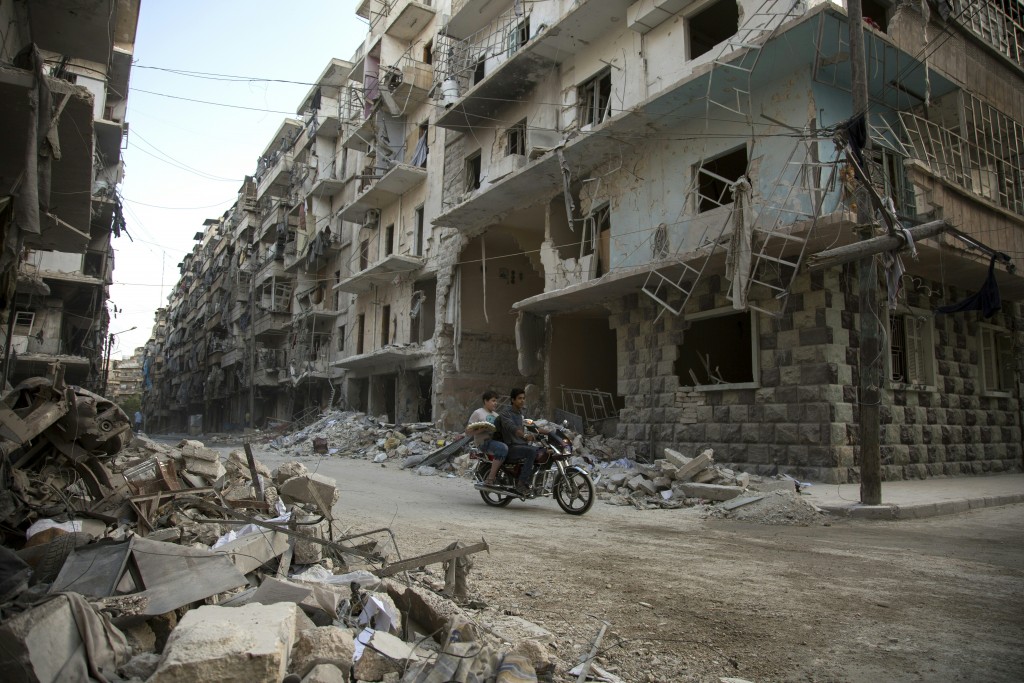
The Syrian army said late on May 4 that it had agreed to calls from Russia and the United States for a two-day truce in Aleppo that would begin from 1:00 am on May 5.
Renewed fighting in recent days, especially in and around Aleppo, had threatened the full collapse of the February 27 ceasefire agreement, a landmark in attempts to finally resolve a conflict that has left more than 270,000 dead. / AFP PHOTO /
by Karam al-Masri
ALEPPO , Syria (AFP) — A temporary truce in the Syrian battleground city of Aleppo was extended for 72 hours from 00:01 Saturday, as clashes raged further south.
The extended pause in fighting for Aleppo comes as international condemnation mounted over deadly air strikes on a camp for displaced people in northern Syria, which the regime and its Russian ally have denied responsibility for.
Russia’s defense ministry said the fragile ceasefire had been extended “in order to prevent the situation from worsening” just minutes before the initial 48-hour truce for the city was due to expire.
“The regime of silence in the province of Latakia and in the city of Aleppo has been extended from 00:01 (local time) on May 7 (2200 GMT Friday) for 72 hours,” the defense ministry said in a statement.
The United States — which has been working with Moscow to pressure the regime to stop the violence and revive a landmark nationwide ceasefire agreed in February — also confirmed the extension.
“While we welcome this recent extension, our goal is to get to a point where we no longer have to count the hours and that the cessation of hostilities is fully respected across Syria,” said State Department spokesman John Kirby.
The international community hopes that a drop in fighting can galvanize faltering peace talks to end a five-year war that has killed more than 270,000 people and displaced millions.
Calm returned to the streets of Aleppo after the ceasefire first came into force at midnight on Thursday, giving residents some respite from two weeks of fighting that killed more than 280 civilians.
But south of the city, clashes between regime forces and jihadists and their allies have killed more than 70 on both sides, the Syrian Observatory for Human Rights said on Friday.
Al-Nusra and allied Islamists seized Khan Tuman and surrounding villages in less than 24 hours, according to the Britain-based monitor, after pro-regime troops had driven them out in December.
UN’s Ban ‘outraged’
Women and children were reported to be among 28 civilians killed in Thursday’s raids on the camps near the Turkish border, which also wounded 50.
Mamun al-Khatib, director of the Aleppo-based pro-rebel Shahba Press news agency, accused “regime aircraft” of firing missiles at the camp in Al-Kammouna village Thursday — an accusation Damascus denied.
“There is no truth in the information in some media that the Syrian air force targeted the displaced camp in Idlib province,” the official SANA news agency quoted the military as saying.
Russia’s military also insisted no aircraft flew over the camp on Thursday, suggesting Syria’s Al-Qaeda affiliate Al-Nusra Front could have shelled it.
“The camp may have been shelled either on purpose or by mistake by multiple rocket launchers which are currently being used very actively in this area by terrorists from Al-Nusra,” spokesman Igor Konashenkov told Russian news agencies.
UN Secretary General Ban Ki-moon said he was “outraged” by the attack on the camp and said those responsible must face justice.
Ban demanded once again that the UN Security Council refer Syria to the International Criminal Court so that the tribunal based in The Hague can open up investigations of possible war crimes.
The US earlier described the raids as “totally in keeping” with the regime’s past operations.
“There’s absolutely no justification for attacks on civilians in Syria, but especially on what appears to have been a refugee camp,” State Department spokesman Mark Toner said.
UN rights chief Zeid Ra’ad Al Hussein said the camp’s tents could clearly be seen from the air so it was “extremely unlikely” to have been an accident.
“It is far more likely they were deliberate and amount to a war crime,” he said.
Regime aircraft have previously targeted rebels other than Al-Nusra Front and the Islamic State group, which are not covered by the February 27 ceasefire between the regime and non-jihadist rebels.
Russia also launched air raids in support of Damascus in September, and a US-led coalition has conducted air strikes against IS in Syria since 2014.
Prison assault
In central Syria, regime forces launched an assault against a prison in the central city of Hama aimed at ending a mutiny, the Observatory said.
The mutiny began on Monday after an attempt to transfer inmates to the military-run Saydnaya prison near Damascus.
Human Rights Watch said it had received WhatsApp messages from inmates saying that security forces “were attempting to storm their prison block, using tear gas and rubber bullets.”
It said the assault “raises major concerns about possible excessive use of force”.
As warplanes hit the Idlib camp on Thursday, Syria’s regime celebrated its recapture of the ancient city of Palmyra with a concert in its amphitheater.
A second concert conducted by Valery Gergiev was staged in the floodlit amphitheater late Friday.
Before regime troops backed by Russian warplanes retook Palmyra in late March, the theater was a backdrop for IS executions.
bur-srm/as/mtp
© 1994-2016 Agence France-Presse








